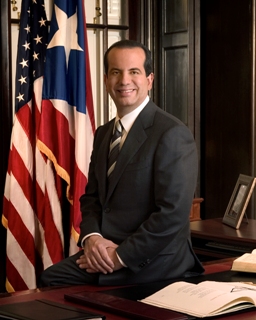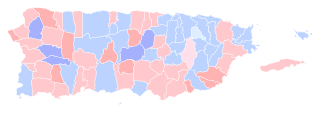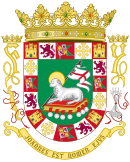
The politics of Puerto Rico take place in the framework of a democratic republic form of government that is under the jurisdiction and sovereignty of the United States Congress as an organized unincorporated territory. Since the 1898 invasion of Puerto Rico by the United States during the Spanish–American War, politics in Puerto Rico have been significantly shaped by its status as territory of the United States. The nature of Puerto Rico's political relationship with the United States is the subject of ongoing debate in Puerto Rico, in the United States, the United Nations and the international community, with all major political parties in the archipelago calling it a colonial relationship.

Carlos Antonio Romero Barceló was a Puerto Rican politician who served as the governor of Puerto Rico from 1977 to 1985. He was the second governor to be elected from the New Progressive Party (PNP). He also served 2 terms in Congress as the Resident Commissioner of Puerto Rico from 1993 to 2001.

Pedro Juan Rosselló González is a Puerto Rican physician and politician who served as the governor of Puerto Rico from 1993 to 2001. He was President of the New Progressive Party from 1991 to 1999 and 2003 to 2008, and served as Senator for the District of Arecibo from 2005 to 2008. His son, Ricardo, was also Governor of Puerto Rico from 2017 to 2019.

The New Progressive Party is a political party in Puerto Rico that advocates statehood. The PNP is one of the two major parties in Puerto Rico with significant political strength and currently holds both the seat of the governor and of the resident commissioner.

Luis Guillermo Fortuño Burset is a Puerto Rican politician who served as the governor of Puerto Rico, an unincorporated territory of the United States, from 2009 to 2013.

Thomas Rivera Schatz is a Puerto Rican politician, legal advisor, attorney, and former prosecutor, who was the fourteenth and sixteenth President of the Senate of Puerto Rico. He is affiliated with New Progressive Party of Puerto Rico and the mainland Republican Party. On July 22, 2019, Rivera Schatz announced that he will take over as acting chair of the PNP following the resignation of Ricardo Rosselló due to the Telegramgate scandal.
Carlos Ignacio Pesquera-Morales is a Puerto Rican civil engineer who served as the Secretary of Transportation and Public Works of Puerto Rico from 1993 to 1999. He ran in the 2016 New Progressive Party primary to be Puerto Rico's Resident Commissioner as Pedro Pierluisi's ballot running mate, but lost by over 70% of the vote to state representative Jenniffer Gonzalez. He is married to Irasema Rivera, an agronomist, and has one son and one daughter. He currently resides in Guaynabo, Puerto Rico.

General elections were held in Puerto Rico on Tuesday, November 4, 2008, to elect the officials of the government that would serve for the next four years, most notably the Governor of Puerto Rico.

Aníbal Salvador Acevedo Vilá is a Puerto Rican politician and lawyer. He served as the governor of Puerto Rico from 2005 to 2009. He is a Harvard University alumnus and a graduate of the University of Puerto Rico School of Law, where he obtained his Juris Doctor degree. Acevedo Vilá has held various public service positions in the Puerto Rico government under the Popular Democratic Party, serving as a member of the House of Representatives of Puerto Rico (1993–2001) and as the 17th Resident Commissioner (2001–2005), before he was sworn in as Governor on 2 January 2005. Acevedo Vilá was also a member of the National Governors Association, the Southern Governors' Association and the Democratic Governors Association, and a collaborator of President Barack Obama's presidential campaign. Also he is currently an adjunct professor of the University of Puerto Rico School of Law. He unsuccessfully ran for Resident Commissioner of Puerto Rico in the 2020 elections for the Popular Democratic Party.

The Popular Democratic Party is a political party in Puerto Rico that advocates to continue as a Commonwealth of the United States with self-governance. The party was founded in 1938 by dissidents from the Puerto Rican Liberal Party and the Unionist Party and originally promoted policies on the center-left. In recent years, however, its leaders have described the party as centrist.

General elections were held in Puerto Rico on Tuesday, November 6, 2012, to elect the officials of the Puerto Rican government that would serve for the next four years, most notably the Governor of Puerto Rico. A status referendum was held on the same date.

The 2008 New Progressive Party primaries were the primary elections by which voters of the New Progressive Party (PNP) chose its nominees for various political offices of Puerto Rico, namely the position of governor, for the 2008 general elections. Resident Commissioner Luis Fortuño was selected as the nominee at the primary elections held on March 9, 2008. He would go on to win the 2008 general election as well.

The 2012 New Progressive Party primaries were the primary elections by which voters of the New Progressive Party (PNP) chose its nominees for various political offices of Puerto Rico for the 2012 general elections. They were held on March 18, 2012 and coincided with the Republican Party primaries in the island.

The 2003 New Progressive Party primaries were the primary elections by which voters of the New Progressive Party (PNP) chose its nominees for various political offices of Puerto Rico, namely the position of governor, for the 2004 general elections. Former Governor Pedro Rosselló was selected as the nominee at the primary elections held on November 9, 2003. He would go on to narrowly lose the 2004 general election against Aníbal Acevedo Vilá, from the Popular Democratic Party (PPD).

A constitutional referendum was held in Puerto Rico on 19 August 2012. Voters were asked whether they approve of two amendments to the constitution: one to eliminate the absolute right to bail and the other to decrease the number of members of the Legislative Assembly. Despite support from the party in government and part of the main opposition party, both amendments were rejected by voters.

General election were held in Puerto Rico on Tuesday, November 8, 2016, to elect the officials of the Puerto Rican government to serve from January 2017 to January 2021, most notably the Governor of Puerto Rico. Ricardo Rosselló was elected governor and Jenniffer González-Colón was elected Resident Commissioner. The elections saw a 23 percentage point drop in turnout and was the lowest voter turnout in Puerto Rican history.

A referendum of the status of Puerto Rico was held on November 3, 2020, concurrently with the general election. The Referendum was announced by Puerto Rico Governor Wanda Vázquez Garced on May 16, 2020. This was the sixth referendum held on the status of Puerto Rico, with the previous one having taken place in 2017. This was the first referendum with a simple yes-or-no question, with voters having the option of voting for or against becoming a U.S. state. The New Progressive Party (PNP), of whom Vázquez is a member, supports statehood, while the opposition Popular Democratic Party (PDP) and Puerto Rican Independence Party (PIP) oppose it.

General elections were held in Puerto Rico on November 3, 2020, to elect the officials of the Puerto Rican government who will serve from January 2021 to January 2025, most notably the position of Governor and Resident Commissioner. In addition, there was a non-binding status referendum to ask voters if Puerto Rico should become the 51st state of the Union.

A special election to elect shadow senators and shadow representatives from Puerto Rico was held on May 16, 2021. Voters chose two special delegates to the United States Senate and four special delegates to the United States House of Representatives. Their work is to demand that the US Congress respect and enforce the results of the 2020 status referendum, and admit Puerto Rico as the 51st state of the Union.

A non-binding referendum will be held in Puerto Rico on November 5, 2024, alongside the 2024 Puerto Rican general election and the 2024 United States elections.

















